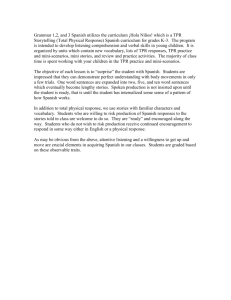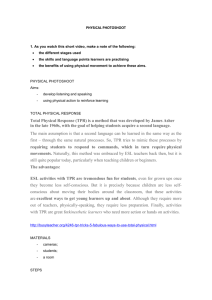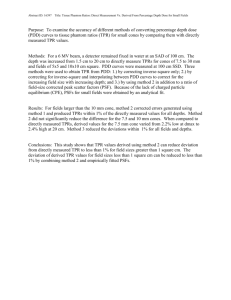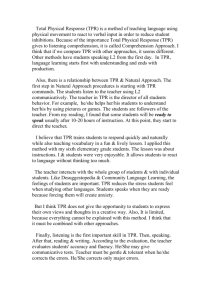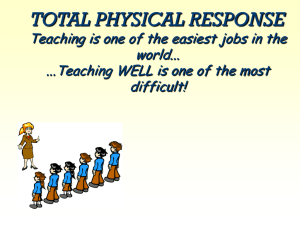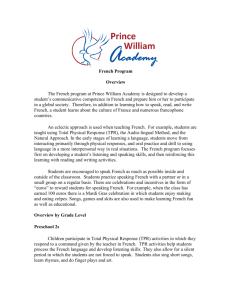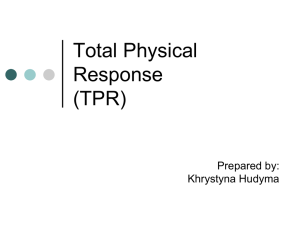Playway
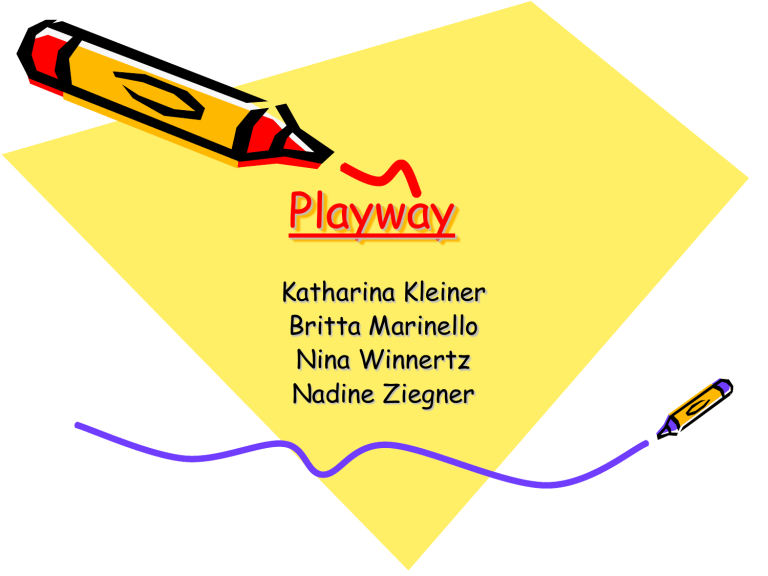
Playway
Katharina Kleiner
Britta Marinello
Nina Winnertz
Nadine Ziegner
Playway Cover
Overview
• Definitions: listening & speaking
• Theoretical background
– Storytelling
– TPR
• Comparison of two units from “Playway“
– Contents and types of exercises
– Graphics, colours, animations
– Language
• Curriculum
• In-class experiences
– Language use in class
– Pupil‘s participation
• Conclusion & discussion
Group I:
Listening & Speaking
• Listening = constructing meaning from incoming information through oral and mental devices
• Speaking = activating mental processes; controlles use of oral organs to convey meaning
TPR
(=Total Physical Response)
• TPR is a second language teaching method developed by Dr. James
Asher during the 1970’s
• TPR is hardly used in Germany, but it becomes more and more a german curriculum
• TPR shows the best way for students to acquire foreign language skills.
• TPR mimics how a person learns his native tongue, by incorporating gestures, facial expressions and other physical movements
• TPR first trains aesthetics, feeling and creativity
• The new language is acquiered not memorized
• Student learns and retains the new language since phrases are associated with sounds, physical movements, expressions and feelings
• When student is ready logic, analysis and accuracy follows => language is spoken
=> foreign language is not taught as a translation of English, it is absorbed directly
• TPR captures students’ attention and interest
• Emphasis on understanding the language
• It is important not to disrupt their flow of speech in order to correct the problem
• TPR has two factors: pronounciation and vocabulary
• Students can express themselves through original sentences
Teaching TPR
• TPR is executed simply by teaching language through commands, which introduce new vocabulary
• Example in french: : Leve toi! Assieds-toi! Touche
la table! Pose le livre! (steh auf ! setz dich!
Berühre den Tisch! Leg das Buch hin)
• If the class makes progress add new vocabularies by combining two commands e.g.: Pose le livre sous
la table (Leg das Buch auf den Tisch)
• Tenses can be incorporated in TPR commands as well e.g.: Quand je touche la table, Marie se
mettra debout (Wenn ich den Tisch berühre, setzt Marie sich dort hin)
How a TPR-teacher should be
• A TPR teacher must always be “on”
• He has to be active, energetic and in a leading role
• He has to be adequately prepared
• Introduce not more than three new vocabulary words at a time and repeat these words until everybody understands them
Problems of TPR
• TPR can minimize the distortion in pronunciation that comes from seeing the written words before pronouncing them
• TPR is not a textbook based curriculum.
Teachers who use TPR are creative in their quest for classroom props and materials to use with students
Storytelling
Why Storytelling?
• academic sucess and emotional well being to students
• good for student exploration
• including all ages and abilities
• no special equipment is needed to create artistic images
• students explore their individual impressions
• communication, thoughts and feelings can be expressed
• possibility to show students the strenghts of spoken words, listening is important
Gaining Verbal Skills
• to discuss interpersonal conflicts can lessen violence
• the expression of one’s thoughts and feelings is important
• Clear communication is the first step of being able to ask for help when it’s needed
Imagination
• telling a story or listening to a story makes students use their imagination
• Developing the imagination helps students to consider new ideas
• Developing the imagination can contribute to self-confidence and personal motivation
• People are able to air their hopes and dreams
Passing on Wisdom
• storytelling helps young people to get over with personal values
• imaginative situations can be used to see wise and unwise actions and decisions of the young people
How Storytelling Can Be
Used In Class
Old Time Radio Show:
• Using PA system to imitate an old radio show
• Class has to create a story broadcast at a special time each week for the whole school
• Tape recorder is used for to hear the later sound
• The show could have a magazine format, featuring interviews with teachers, student stories or poetry, or discussion of the latest school issues.
Story Circle
• One person starts a tale and stops after a few sentences.
• Next person picks up the story, continues it and stops again
• Next person adds to it and so on until the tale comes to a resolution
• Start of the story could be a pre-selected title or subject
• You can record the story on a tape to be able to listen to it in a later time
Unit 1
• topic: “Back to school”
• many pictures to arouse the pupils interest
• song “Hurry up”
• “Listen and remember” -> think about experiences in 3rd grade
• “Listen and point” -> improve listening skills
Unit 11
• chapter deals with “Feelings”
• song and chant (= Sprechgesang) -> speaking and listening skills
• “Listen to the dialogue. Act it out.” -> this kind of exercise improves the pupils’ ability to speak freely
• work with a partner -> social competences
• comics, puzzles and games
Comparison Unit 1 and 11
• both mostly based on cassette
• within each chapter one can find an increase in demands and information
• unit 1 -> revision of what they’ve already learned; mainly concentrates on listening
• unit 11 ->mainly concentrates on speaking and acting; deals with a complex topic
Contents and types of exercises
• child-oriented topics and exercises
(games,...)
• intercultural learning: children from different countries
• authentic (every-day) topics
(Christmas, shopping, Halloween,...)
Graphics / Colours /
Animations
• funny and exciting layout -> many pictures, powerful colours
• comical elements <-> photos of children of their age
• glove puppet “Birdy” -> motivation
Language
• easy words
• repetition of phrases
• not very much variation in choice of words
• easy understandable chunks
Matching with the curriculum
some aspects from the Lehrplan 2003:
• some important topics and situations
(“Erfahrungsfelder” p. 32) you can find in
PLAYWAY:
• through the year
• special days (Christmas, Halloween)
• at school
• me and my family
Aufgabenschwerpunkte
Unterrichtsgegenstände
Kommunikative
Fähigkeiten und
Fertigkeiten erwerben vereinfachte und einfache authentische
Texte hörend verstehen
Sprachliche Mittel erwerben
• Aussprache und
Intonation erlernen
•Redemittel erwerben
Intercultural Learning
Aufgabenschwerpunkte
Unterrichtsgegenstände
Lebenswelten erschließen und vergleichen
• kulturelle Vielfalt in englischsprachigen
Ländern wahrnehmen
•Spiele, Lieder
Sprachenlernen
Aufgabenschwerpunkt
Unterrichtsgegenstände mit Texten umgehen • Szenen spielen
• Kinderlieder- und reime kennen lernen
•kurze Texte mit bekanntem Wortmaterial erlesen
Conclusion: Matching with the Curriculum
• Does it match? – YES, it does! ;-)
• Playway contains a lot of different topics, excercises etc. that stick to the rules from the curriculum
• it mainly concentrates on listening and speaking, but it doesn‘t exclude the other skills (vocab & grammar; reading & writing)
“In-class exprience”
The usage of target language and mother tongue:
During our participation in English lessons we all made similar experiences:
• The language which was mostly spoken in class was English
• The teachers only spoke English, e.g they greeted the pupils in English, they introduced new topics in English and they explained the tasks in English
• They only used English materials e.g. worksheets, films and music-CDs
• Only if someone didn’t understand some English tasks the teachers explained it in German
As you can see in our primary schools, the target language in English lessons is more important than the mother tongue.
• Most of the pupils had no difficulties to understand all the English things the teacher said
• Most of the pupils were able to work with this kind of teaching
The pupils reaction and participation
• The pupils liked to use the target language in English lessons
• They had fun to use the English language
• There was always a lot of interaction and participation in class, e.g. pupils sang English songs, they played English games, there was a lot of group work
• They used the target language among each other in English projects e.g. an English puppet show aroused the pupils interest
Conclusion
We think that on the one hand
• the book is really attractive for young learners
…as there are many pictures, comics and games
…as they are many listening parts
…as there are interesting topics.
But on the other hand we share the opinion that
• teachers should also use exercises from other books
…as “Playway” is mostly based on listening and speaking skills but neglects writing skills.
